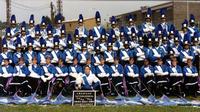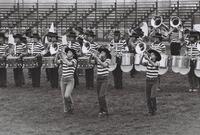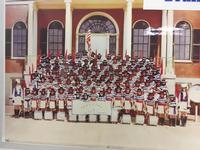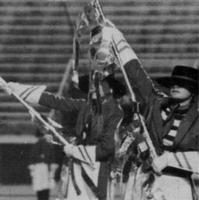Arbella All Girls
Salem, MA United States
Founded: 1975

All Girls
| Year | Position | Score | Theme/Songs |
|---|---|---|---|
| 1979 | 301 | 67.350 | Russian Sailor's Dance (from The Red Poppy) * You and I * La Fiesta * Evergreen (from A Star is Born) |
| 1980 | Sabre Dance * Come Sail Away * La Fiesta | ||
| 1981 | 302 | 58.800 | Ritual Fire Dance (from El Amor Brujo) |
| 1982 | 204 | 56.950 | Invitation to a River * Cuernos * Drum Solo * Golden Slumbers * Carry That Weight * The End |
| 1983 | To Sir, With Love |
CORPS Photos
The Arbella “All Girls” drum and bugle corps was formed in the fall of 1975 through a merger of two girls corps, the Comets and the Rockettes. In fact, the two organizations combined efforts to sponsor the 1975 “Drum Corps on Parade” competition that summer.
Prior to that year, both organizations struggled to survive between remaining active and inactivity. They began the season operating separately in early fall but soon concluded that in order to offer the best chance of fielding a competitive corps in 1976, they would merge and create a single unit. The corps was to be named “Arbella”, after John Winthrop’s Arbella fleet brought the first settlers to Salem back in 1630. The corps was extremely young, with an average age of just under 11 years old but the organization was focused, the members were eager kids to learn and they had a tremendous amount of support from the parents.
On the down side, there was a great deal of consternation regarding this decision and a lot of unhappy people, including most of the instructional staffs who ultimately resigned after the decision was announced. Over the next few weeks, a new instructional staff was formed comprised completely of Cardinal Alumni that included Peter Furnari on percussion, Jim Dennesen and George D’Iorio on brass, Marty Grant on visual and Sue Cawley, assisted by Greg Jacobsen on guard.
With this inexperienced group, selecting music was a challenge. It had to be fairly simple, but interesting enough to generate interest and decent scores. Week after week saw incremental improvement as the kids continued to push the envelope. Then, the night before the maiden voyage of the Arbella, something amazing happened. At the dress rehearsal, wearing the uniforms for the very first time, things started to click. It wasn’t perfect, but it was so much better than any of us could have ever predicted.
As if some magical thing had happened, most of the major mistakes started to disappear. This phenomenon, which became a constant, would come to be known by the instructors as ‘the miracle of the uniforms’. Like flipping a light switch, when those uniforms went on, performance levels rose significantly. The corps entered the field of competition as members of the 1976 Mayflower “Class B” circuit, competing in 9 contests and finished a very respectable 3rd at the championships.
The strength of the organization, outstanding support from parents and a common focus resulted in an inaugural year that was nothing short of miraculous. And the journey was just beginning. In preparation for the 1977 season, we joined a second circuit, Eastern Massachusetts, essentially doubling our competition schedule. With that inaugural achievement under our belts, expectations were higher for year two. As with most drum corps organizations in autumn, changes in personnel took place as the leaves fell. A number of older girls were gone, our visual staff left, and there were new faces on the board of directors. In any organization, adjustments are inevitable, but we hoped to maintain the momentum we had built in our first year.
The beginning of the off season for drum corps is a time when program ideas are formulated and the ’77 program was more musically complex while still respecting the limits of the young musicians. The corps lost a great assistant when Jim Dennesen moved away to attend UMass Amherst that year. Fortunately, Michael D’Iorio, a music major, stepped in to take over the position. It was around this time discussions were being held about long term goals for the corps. With the surprising success they had in 1976, Arbella had gained confidence. They believed that with a strong repertoire and a full offseason, the corps could be a serious contender in “Class B” in 1977.
Looking at the fairly narrow number of competitors in the “All Girls” class at that time, approximately 30, the group saw another opportunity. Several of these corps were strong on a National level and most of them competed in the “Class A” division. Therefore, it was decided they would remain in the “Class B” ranks over the next two seasons with the ultimate goal of competing for an “All Girls” world title by 1979.
Of course, first things first. The unit needed to show marked improvement in 1977, contending for top honors in the “Class B” local circuits. As the musical program began falling into place, we rolled up our sleeves. We had an influx of new members, and some of them already had some musical training, so they were quickly added to the horn line or drum line. While the music side of the program was coming together, there was the matter of filling the void in the visual instructional staff. Mr. LeFrancois, president of the board, knew Richard ‘Dick’ Pelletier well because they attended the same church and had become friends.
Dick was a legendary drum major for St. Mary’s Cardinal’s, many years and he had significant experience as a drill instructor with numerous corps across New England. Mr. LeFrancois brought him in, and the board hired him fairly quickly. His wife, Carla, was added to teach the color guard. With only a few weeks to go before they hit the field, the corps was much better prepared than in 1976. The full off-season had been extremely beneficial. Because of rainy weekends, it was still ‘down to the wire’ in completing the drill, but musically we were in good shape and the kids were really focused.
Dick finished teaching the drill a week before our first show and we spent the final days correcting the major problems. Even the curvilinear patterns were shaping up. The kids were marching with authority and Dick’s emphasis on carriage and fundamentals were really showing through. That summer, Arbella "All Girls" competed at the World Open “Class B” championships and were completely stunned when it was announced they qualified for the finals in their very first major regional contest.
Since they never expected to make the finals, the corps did not have a “Class B” length show. As a result, they were penalized heavily for being under time, and ended up 7th.While the instructors were delighted at having simply made the finals and getting the experience of competing at night, the kids were totally dejected at coming in ‘last’. When the members got back to Arbella hall, they were obviously upset and there were many tears. The kids were told that in making the finals, they had defeated 20 other corps and they should be celebrating. But the tears did not subside.
Even telling them that they would have placed 5th among All-Girl corps did not help. Whether instilled by the instructors or the kids themselves, this corps craved success. As instructors, we decided we would not be in that same position again – if we made the finals next year, we would be ready. Locally, the corps was crowned the Mayflower “Class B” champions and narrowly lost the Eastern Massachusetts “Class B” championships with a second place finish. It truly had been a year for growth.
The “All Girls” corps took some major steps forward in performance and were right near the top of their class. But ending the season with that loss left everyone with a healthy sense of unfinished business. Looking ahead to 1978, they were determined to strive for more. In 1978, Arbella continued its progression by expanding their regional championship participation with an appearance at the American International Open “Class A” contest, placing 3rd in the finals. They also returned to the World Open “Class B” championships as a finalist, finishing 2nd. In circuit competition, the corps won both the CYO “Prep Class” and Eastern Massachusetts “Class A2” championships.
The following season was undeniably the most successful year of competition for the corps as they executed their plan set a few years back to perfection. This would be their first showing in the “All Girls” category and they did not disappoint. During the latter part of the season, the corps first appeared at the CYO Nationals, an invitation bestowed upon a select few corps within the activity. They then pursued their journey at the World Open “All Girls” class, winning the championship flag.
Finally, they arrived at the DCI championships with enormous confidence in their sails and went on to achieve their ultimate goal of being the top “All Girls” corps in the activity when they were crowned the DCI 1979 “All Girls” champions. Not only did the corps win top honors but they came back from a 4 ½ point deficit in the prelims to accomplish this feat, culminating in a “dream come true” scenario for the organization. In 1980, Arbella returned to both the American International Open, placing 6th in the “Class A” division finals and finished 2nd, a mere ½ a tenth behind first place at the World Open “All Girls” class finals. They also participated at their first American Legion championships and won the title convincingly.
The 1981 season saw the corps perform at a higher level, finishing as the top “All Girls” corps at all the major regional championship finals including the American International Open, Key to the Sea, US Open and the DCI Midwest where they placed 1st overall within the “Class A & All Girls” division. They capped off the season with a 2nd place finish at the DCI “All Girls” division championships.
In 1982, as membership was dropping, the corps made the decision to go coed and so ended a memorable era within the “All Girls” drum corps activity. Arbella “All Girls” enjoyed many successes over a short period of time and was well respected for their determination and persistence.
George D’Iorio; Paul Legault (DCX)
-
1977 2 scores
Highest Score 64.750
Final show in DCX Archives July 29, 1977 World Open Class B Prelims Lynn MA placed 6 with a score of 64.750
-
1979 8 scores
Highest Score 67.350
Final show in DCX Archives August 16, 1979 DCI World Championships - Class A and All Girl Finals Birmingham AL placed 1 with a score of 67.350
-
1980 4 scores
Highest Score 64.550
Final show in DCX Archives August 16, 1980 American Legion National Championships Boston MA placed 1 with a score of 64.550
-
1981 2 scores
Highest Score 66.850
Final show in DCX Archives August 20, 1981 DCI World Championships Class A and All-Girl Finals Montreal QUE Canada placed 2 with a score of 58.800
-
1982 8 scores
Highest Score 58.800
Final show in DCX Archives August 20, 1982 DCI World Championships Class A Finals Montreal QUE Canada placed 4 with a score of 56.950
-
1983 8 scores
Highest Score 50.200
Final show in DCX Archives August 6, 1983 American International Championships Butler PA placed 9 with a score of 38.600
Members (7)
| Member Name | Section | Years Involved |
|---|---|---|
| Christie, Glenn-Paul | 1st Soprano | 1982 |
| Gonya, Douglas | Hornline, Contra | 1982 to 1983 |
| Hollis, Mary | Color Guard | 1980 to 1981 |
| Poussard, Lauren | Soprano | 1979 to 1983 |
| Poussard, Lauren | President | 2011 |
| Sheehan, Kellee | baritone | 1975 to 1977 |
| Spanks, Carol | Horn (Saprano) | 1978 to 1981 |
LOADING.....





